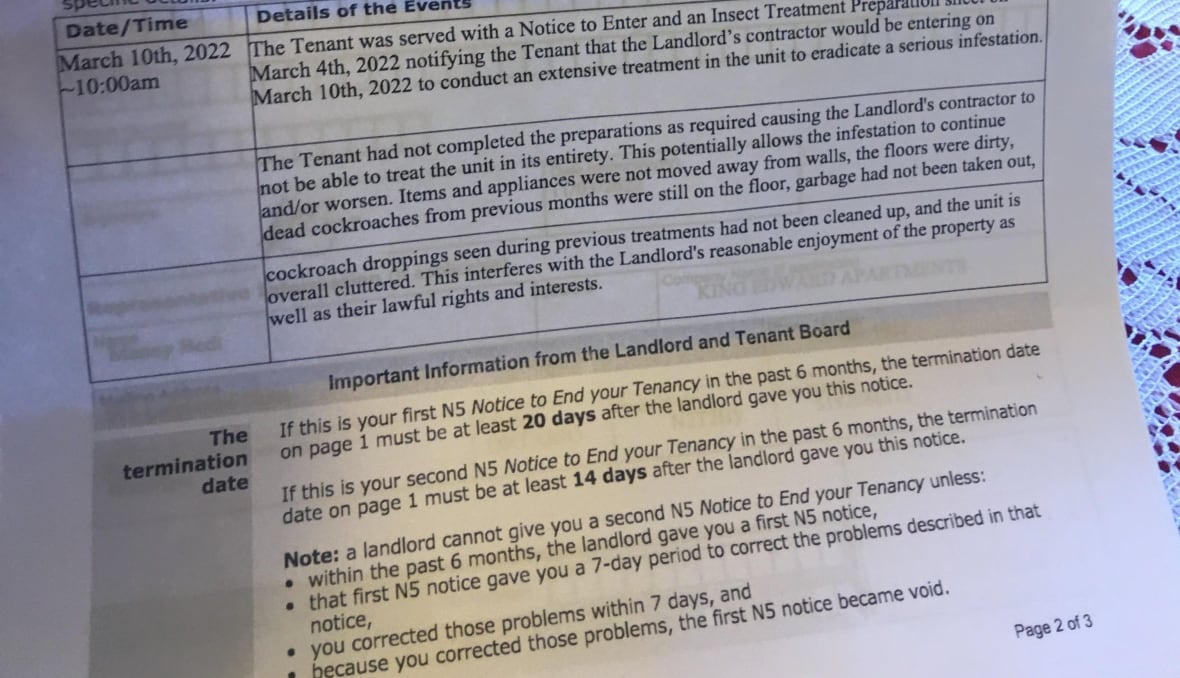CBC News: ‘Flimsy’ N5 notices evicting scores of London tenants, tenant group says
Posted March 22, 2022
Posted March 22, 2022
 Should her landlord be successful in ending her 20-year tenancy, 66-year-old Lea Donaldson can only think of two possible destinations.
Should her landlord be successful in ending her 20-year tenancy, 66-year-old Lea Donaldson can only think of two possible destinations.
“I’ll end up on the street or in a shelter, and I’m not doing that,” she said.
Donaldson lives with her brother on the fifth floor of a rundown apartment building at 80 King Edward Ave. in south London. The building, along with a handful of neighbouring apartment buildings on the same property, were sold in February for $18,800,000.
The purchaser was Eagle Apartments Ltd. The vendor was Vangar Properties Inc., who’d purchased the buildings in 2012 for $6,258,000.
Over this past year, Donaldson and more than 50 of her neighbours in her building and others at 84-96 King Edward Ave., have been issued N5 forms. The N5 is a legal notice which indicates a landlord’s intention to evict because the tenant is causing damage, overcrowding or interfering with others.
But Donaldson, who has health issues and uses a walker, said she’s been a model tenant over the past two decades. So why is she now facing eviction? According to the N5 filed by the landlord, she failed to tidy up and move furniture and appliances away from walls as required for a spraying for cockroaches the landlord had notified her about a week earlier.
“The tenant had not completed the preparations as required, causing the landlord’s contractor to not be able to treat the unit in its entirety,” the notice says. It lists other issues, such as the garbage in the suite was not taken out, the floors were dirty and dead cockroaches from previous treatments were still on the floor.
Donaldson denies this and says she did prepare, although admits that moving furniture and appliances isn’t something she can do. She thinks the real reason for the notice has more to do with the fact she’s only paying $800 a month for a suite that could rent for much more on the open market.
“They want to double the rent,” she said. “In some cases, they want to triple it.”
Incentive to oust long-term tenants
Without approval from the Landlord and Tenant Board, landlords in Ontario are only allowed to increase rent for most existing tenants by the province’s annual rent increase for inflation. This year that guideline is set at 1.2 per cent.
But when suites become vacant, landlords can reset the rent to any amount new tenants are willing to pay.
CBC News reached out to Eagle Apartments and to Universal Property Management, the Waterloo-based company that manages the building. Neither responded to a request for an interview.
If Donaldson suspects the N5 is not about preparation for the bug spraying appointment, she’s not alone.
Jordan Smith is with the London branch of the tenants’ advocacy group ACORN. His group interviewed more than 60 tenants on King Edward who received N5s following bug spray appointments since the building changed hands.
“Based on what we’ve heard these N5 notices are being brought up on very flimsy, and in some cases totally bogus, premises,” said Smith. “The reason they’re getting these notices is because of the lack of rent control in Ontario. There’s a clear incentive right now to get tenants out who have grandfathered rents.
“There’s already been scores of senior citizens who’ve been evicted,” added Smith, based on the interviews his group has done with tenants. “One building used to be filled with seniors, now there’s four.”
Smith says tenants have already moved from buildings on King Edward Avenue after receiving N5s for reasons similar to the ones cited on Donaldson’s form.
He said the misuse of N5s is being used in Ontario to turn over tenants: “It’s becoming a devastating problem,” he said.
‘This is harassment’
 Lynette Morees has lived at 84 King Edward Ave. for nine years with her husband and three children. In February she was also served an N5, the stated reason being her suite was dirty and not prepared for a bug spraying appointment. However, she says she followed the instructions to the letter. Like Donaldson and Smith, Moraes believes it’s really about getting long-term, lower-paying tenants out.
Lynette Morees has lived at 84 King Edward Ave. for nine years with her husband and three children. In February she was also served an N5, the stated reason being her suite was dirty and not prepared for a bug spraying appointment. However, she says she followed the instructions to the letter. Like Donaldson and Smith, Moraes believes it’s really about getting long-term, lower-paying tenants out.
“It’s to get them evicted so they can renovate and raise the rent to what they want,” she said. “We didn’t have an issue with the prior landlord. I feel this is harassment.”
While tenants can fight N5 notices at a hearing of the Landlord and Tenant Board (LTB), Smith said the adjudication process can be difficult for tenants to navigate, especially when they’re going against professional landlords who can afford lawyers. The pandemic has pushed LTB hearings to video conferences. ACORN says many tenants don’t have the knowledge or a web-connected device to access online tribunals.
Smith said the real problem is a lack of full rent control in Ontario. His group is calling for changes that would limit rent increases between tenants. He’d also like to see above guideline rent increases go away. Those allow landlords to ask for extra increases in compensation for major repairs or renovations.
ACORN is calling on the province to strengthen the rent controls as soaring rent and property values in London only add to the incentive for landlords to find new ways to get higher rents. They hope to make rent inequity an issue when Ontario voters head to the polls in June.
***
Article by Andrew Lupton for CBC News
